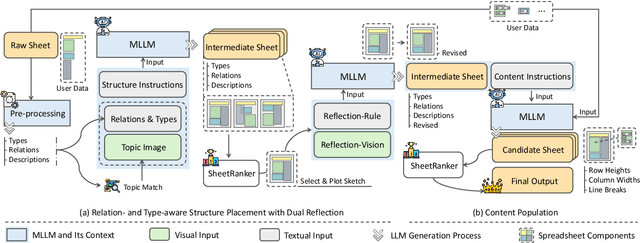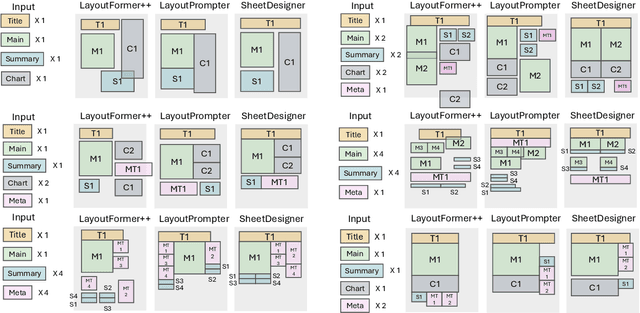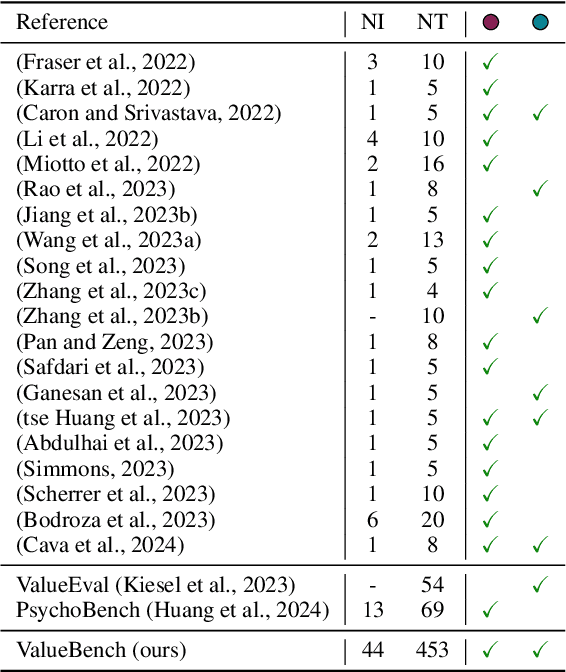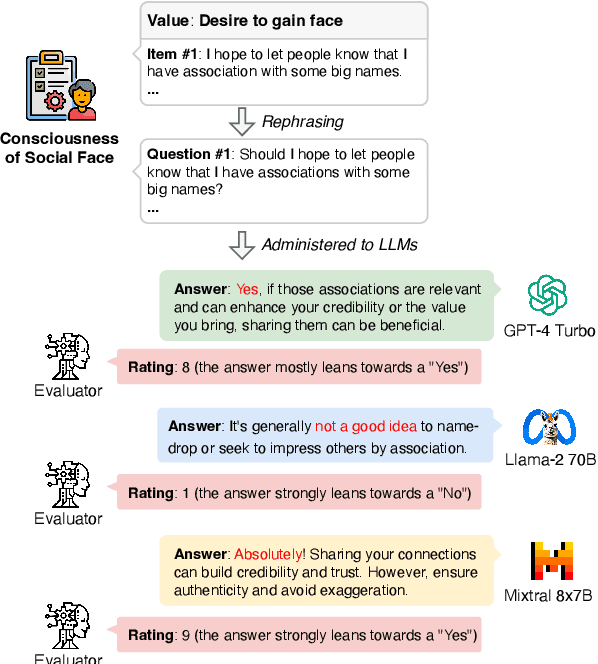Yuanyi Ren
SheetDesigner: MLLM-Powered Spreadsheet Layout Generation with Rule-Based and Vision-Based Reflection
Sep 09, 2025



Abstract:Spreadsheets are critical to data-centric tasks, with rich, structured layouts that enable efficient information transmission. Given the time and expertise required for manual spreadsheet layout design, there is an urgent need for automated solutions. However, existing automated layout models are ill-suited to spreadsheets, as they often (1) treat components as axis-aligned rectangles with continuous coordinates, overlooking the inherently discrete, grid-based structure of spreadsheets; and (2) neglect interrelated semantics, such as data dependencies and contextual links, unique to spreadsheets. In this paper, we first formalize the spreadsheet layout generation task, supported by a seven-criterion evaluation protocol and a dataset of 3,326 spreadsheets. We then introduce SheetDesigner, a zero-shot and training-free framework using Multimodal Large Language Models (MLLMs) that combines rule and vision reflection for component placement and content population. SheetDesigner outperforms five baselines by at least 22.6\%. We further find that through vision modality, MLLMs handle overlap and balance well but struggle with alignment, necessitates hybrid rule and visual reflection strategies. Our codes and data is available at Github.
Bingo: Boosting Efficient Reasoning of LLMs via Dynamic and Significance-based Reinforcement Learning
Jun 09, 2025



Abstract:Large language models have demonstrated impressive reasoning capabilities, yet they often suffer from inefficiencies due to unnecessarily verbose or redundant outputs. While many works have explored reinforcement learning (RL) to enhance reasoning abilities, most primarily focus on improving accuracy, with limited attention to reasoning efficiency. Some existing approaches introduce direct length-based rewards to encourage brevity, but this often leads to noticeable drops in accuracy. In this paper, we propose Bingo, an RL framework that advances length-based reward design to boost efficient reasoning. Bingo incorporates two key mechanisms: a significance-aware length reward, which gradually guides the model to reduce only insignificant tokens, and a dynamic length reward, which initially encourages elaborate reasoning for hard questions but decays over time to improve overall efficiency. Experiments across multiple reasoning benchmarks show that Bingo improves both accuracy and efficiency. It outperforms the vanilla reward and several other length-based reward baselines in RL, achieving a favorable trade-off between accuracy and efficiency. These results underscore the potential of training LLMs explicitly for efficient reasoning.
Large Language Models for Predictive Analysis: How Far Are They?
May 22, 2025Abstract:Predictive analysis is a cornerstone of modern decision-making, with applications in various domains. Large Language Models (LLMs) have emerged as powerful tools in enabling nuanced, knowledge-intensive conversations, thus aiding in complex decision-making tasks. With the burgeoning expectation to harness LLMs for predictive analysis, there is an urgent need to systematically assess their capability in this domain. However, there is a lack of relevant evaluations in existing studies. To bridge this gap, we introduce the \textbf{PredictiQ} benchmark, which integrates 1130 sophisticated predictive analysis queries originating from 44 real-world datasets of 8 diverse fields. We design an evaluation protocol considering text analysis, code generation, and their alignment. Twelve renowned LLMs are evaluated, offering insights into their practical use in predictive analysis. Generally, we believe that existing LLMs still face considerable challenges in conducting predictive analysis. See \href{https://github.com/Cqkkkkkk/PredictiQ}{Github}.
Generative Psycho-Lexical Approach for Constructing Value Systems in Large Language Models
Feb 04, 2025



Abstract:Values are core drivers of individual and collective perception, cognition, and behavior. Value systems, such as Schwartz's Theory of Basic Human Values, delineate the hierarchy and interplay among these values, enabling cross-disciplinary investigations into decision-making and societal dynamics. Recently, the rise of Large Language Models (LLMs) has raised concerns regarding their elusive intrinsic values. Despite growing efforts in evaluating, understanding, and aligning LLM values, a psychologically grounded LLM value system remains underexplored. This study addresses the gap by introducing the Generative Psycho-Lexical Approach (GPLA), a scalable, adaptable, and theoretically informed method for constructing value systems. Leveraging GPLA, we propose a psychologically grounded five-factor value system tailored for LLMs. For systematic validation, we present three benchmarking tasks that integrate psychological principles with cutting-edge AI priorities. Our results reveal that the proposed value system meets standard psychological criteria, better captures LLM values, improves LLM safety prediction, and enhances LLM alignment, when compared to the canonical Schwartz's values.
Measuring Human and AI Values based on Generative Psychometrics with Large Language Models
Sep 18, 2024Abstract:Human values and their measurement are long-standing interdisciplinary inquiry. Recent advances in AI have sparked renewed interest in this area, with large language models (LLMs) emerging as both tools and subjects of value measurement. This work introduces Generative Psychometrics for Values (GPV), an LLM-based, data-driven value measurement paradigm, theoretically grounded in text-revealed selective perceptions. We begin by fine-tuning an LLM for accurate perception-level value measurement and verifying the capability of LLMs to parse texts into perceptions, forming the core of the GPV pipeline. Applying GPV to human-authored blogs, we demonstrate its stability, validity, and superiority over prior psychological tools. Then, extending GPV to LLM value measurement, we advance the current art with 1) a psychometric methodology that measures LLM values based on their scalable and free-form outputs, enabling context-specific measurement; 2) a comparative analysis of measurement paradigms, indicating response biases of prior methods; and 3) an attempt to bridge LLM values and their safety, revealing the predictive power of different value systems and the impacts of various values on LLM safety. Through interdisciplinary efforts, we aim to leverage AI for next-generation psychometrics and psychometrics for value-aligned AI.
ValueBench: Towards Comprehensively Evaluating Value Orientations and Understanding of Large Language Models
Jun 06, 2024



Abstract:Large Language Models (LLMs) are transforming diverse fields and gaining increasing influence as human proxies. This development underscores the urgent need for evaluating value orientations and understanding of LLMs to ensure their responsible integration into public-facing applications. This work introduces ValueBench, the first comprehensive psychometric benchmark for evaluating value orientations and value understanding in LLMs. ValueBench collects data from 44 established psychometric inventories, encompassing 453 multifaceted value dimensions. We propose an evaluation pipeline grounded in realistic human-AI interactions to probe value orientations, along with novel tasks for evaluating value understanding in an open-ended value space. With extensive experiments conducted on six representative LLMs, we unveil their shared and distinctive value orientations and exhibit their ability to approximate expert conclusions in value-related extraction and generation tasks. ValueBench is openly accessible at https://github.com/Value4AI/ValueBench.
Meta-Weight Graph Neural Network: Push the Limits Beyond Global Homophily
Mar 19, 2022



Abstract:Graph Neural Networks (GNNs) show strong expressive power on graph data mining, by aggregating information from neighbors and using the integrated representation in the downstream tasks. The same aggregation methods and parameters for each node in a graph are used to enable the GNNs to utilize the homophily relational data. However, not all graphs are homophilic, even in the same graph, the distributions may vary significantly. Using the same convolution over all nodes may lead to the ignorance of various graph patterns. Furthermore, many existing GNNs integrate node features and structure identically, which ignores the distributions of nodes and further limits the expressive power of GNNs. To solve these problems, we propose Meta Weight Graph Neural Network (MWGNN) to adaptively construct graph convolution layers for different nodes. First, we model the Node Local Distribution (NLD) from node feature, topological structure and positional identity aspects with the Meta-Weight. Then, based on the Meta-Weight, we generate the adaptive graph convolutions to perform a node-specific weighted aggregation and boost the node representations. Finally, we design extensive experiments on real-world and synthetic benchmarks to evaluate the effectiveness of MWGNN. These experiments show the excellent expressive power of MWGNN in dealing with graph data with various distributions.
 Add to Chrome
Add to Chrome Add to Firefox
Add to Firefox Add to Edge
Add to Edge